12、Spring之基于xml的AOP
阅读本文前,建议先阅读Spring之基于注解的AOP
12.1、环境搭建
创建名为spring_aop_xml的新module,过程参考9.1节
12.1.1、配置打包方式和依赖

<?xml version="1.0" encoding="UTF-8"?>
<project xmlns="http://maven.apache.org/POM/4.0.0"
xmlns:xsi="http://www.w3.org/2001/XMLSchema-instance"
xsi:schemaLocation="http://maven.apache.org/POM/4.0.0 http://maven.apache.org/xsd/maven-4.0.0.xsd">
<modelVersion>4.0.0</modelVersion>
<groupId>org.rain</groupId>
<artifactId>spring_aop_xml</artifactId>
<version>1.0-SNAPSHOT</version>
<packaging>jar</packaging>
<dependencies>
<!-- Spring-IOC的依赖 -->
<dependency>
<groupId>org.springframework</groupId>
<artifactId>spring-context</artifactId>
<version>5.3.1</version>
</dependency>
<!-- spring-AOP的依赖 -->
<dependency>
<groupId>org.springframework</groupId>
<artifactId>spring-aspects</artifactId>
<version>5.3.1</version>
</dependency>
<!-- junit测试 -->
<dependency>
<groupId>junit</groupId>
<artifactId>junit</artifactId>
<version>4.12</version>
<scope>test</scope>
</dependency>
</dependencies>
</project>
12.1.2、创建Calculator接口及实现类

package org.rain.spring.aop.xml;
/**
* @author liaojy
* @date 2023/8/18 - 8:09
*/
public interface Calculator {
int add(int i, int j);
int sub(int i, int j);
int mul(int i, int j);
int div(int i, int j);
}

package org.rain.spring.aop.xml;
import org.springframework.stereotype.Component;
/**
* @author liaojy
* @date 2023/8/18 - 8:11
*/
// @Component注解:保证这个目标类能够放入IOC容器
@Component
public class CalculatorImpl implements Calculator {
public int add(int i, int j) {
int result = i + j;
System.out.println("方法内部 result = " + result);
return result;
}
public int sub(int i, int j) {
int result = i - j;
System.out.println("方法内部 result = " + result);
return result;
}
public int mul(int i, int j) {
int result = i * j;
System.out.println("方法内部 result = " + result);
return result;
}
public int div(int i, int j) {
int result = i / j;
System.out.println("方法内部 result = " + result);
return result;
}
}
12.1.3、创建切面类LoggerAspect

package org.rain.spring.aop.xml;
import org.springframework.stereotype.Component;
/**
* @author liaojy
* @date 2023/8/18 - 8:15
*/
// @Component注解:保证这个目标类能够放入IOC容器
@Component
public class LoggerAspect {
}
12.1.4、创建spring配置文件

<?xml version="1.0" encoding="UTF-8"?>
<beans xmlns="http://www.springframework.org/schema/beans"
xmlns:xsi="http://www.w3.org/2001/XMLSchema-instance"
xmlns:context="http://www.springframework.org/schema/context"
xmlns:aop="http://www.springframework.org/schema/aop"
xsi:schemaLocation="http://www.springframework.org/schema/beans http://www.springframework.org/schema/beans/spring-beans.xsd http://www.springframework.org/schema/context https://www.springframework.org/schema/context/spring-context.xsd http://www.springframework.org/schema/aop https://www.springframework.org/schema/aop/spring-aop.xsd">
<!--
对指定的package进行扫描,将使用组件注解的类的对象(本示例是目标对象和切面对象),交给spring的ioc容器来管理
-->
<context:component-scan base-package="org.rain.spring.aop.xml"></context:component-scan>
</beans>
12.2、前置通知的使用
12.2.1、基本示例
12.2.1.1、定义前置通知的功能

public void beforeMethod(){
System.out.println("LoggerAspect,前置通知");
}
12.2.1.2、配置前置通知到切面

<aop:config>
<!--
aop:aspect标签:将ioc容器中的bean对象设置为切面,效果等同于@Aspect注解
ref属性:引用IOC容器中(要设置为切面的)bean的id
-->
<aop:aspect ref="loggerAspect">
<!--
aop:before标签:将方法设置为该切面的前置通知(方法),效果等同于@Before注解
method属性:指定(要设置为前置通知的)方法的名称
pointcut属性:设置该前置通知的切入点表达式
-->
<aop:before method="beforeMethod" pointcut="execution(* org.rain.spring.aop.xml.CalculatorImpl.*(..))"></aop:before>
</aop:aspect>
</aop:config>
12.2.1.3、测试使用效果

由控制台日志可知,切面类的前置通知(方法),通过切入点表达式,作用到了目标方法的连接点上
package org.rain.spring.aop.test;
import org.junit.Test;
import org.rain.spring.aop.xml.Calculator;
import org.springframework.context.ApplicationContext;
import org.springframework.context.support.ClassPathXmlApplicationContext;
/**
* @author liaojy
* @date 2023/8/18 - 19:07
*/
public class AOPTest {
@Test
public void testAOPByXML(){
ApplicationContext ioc = new ClassPathXmlApplicationContext("spring-aopByxml.xml");
// 注意:这里不能直接获取目标对象来使用;因为使用了AOP之后,IOC容器中就只有对应目标对象的代理对象;
// 如果强行获取目标对象,则报错:NoSuchBeanDefinitionException
//Calculator calculator = ioc.getBean(CalculatorImpl.class);
// 虽然不知道代理对象的类名,但可以通过代理对象和目标对象共同实现的接口类型来从ioc容器中获取代理对象
Calculator calculator = ioc.getBean(Calculator.class);
// 只能通过代理对象来访问目标对象中的方法
calculator.div(1,1);
}
}
12.2.2、高级示例
12.2.2.1、改进前置通知的功能

该示例中(前置)通知方法引入了连接点参数,通过连接点参数,可以动态获取(切入点表达式)对应的目标方法的名称和参数列表
// joinPoint参数:可以获取(通过切入点表达式定位出的)连接点的相关信息
public void beforeMethod(JoinPoint joinPoint){
// 获取连接点所对应目标方法的名称
String methodName = joinPoint.getSignature().getName();
// 获取连接点所对应目标方法的参数列表
Object[] args = joinPoint.getArgs();
System.out.println("LoggerAspect-->前置通知,方法名:"+methodName+",参数:"+ Arrays.toString(args));
}
12.2.2.2、测试使用效果
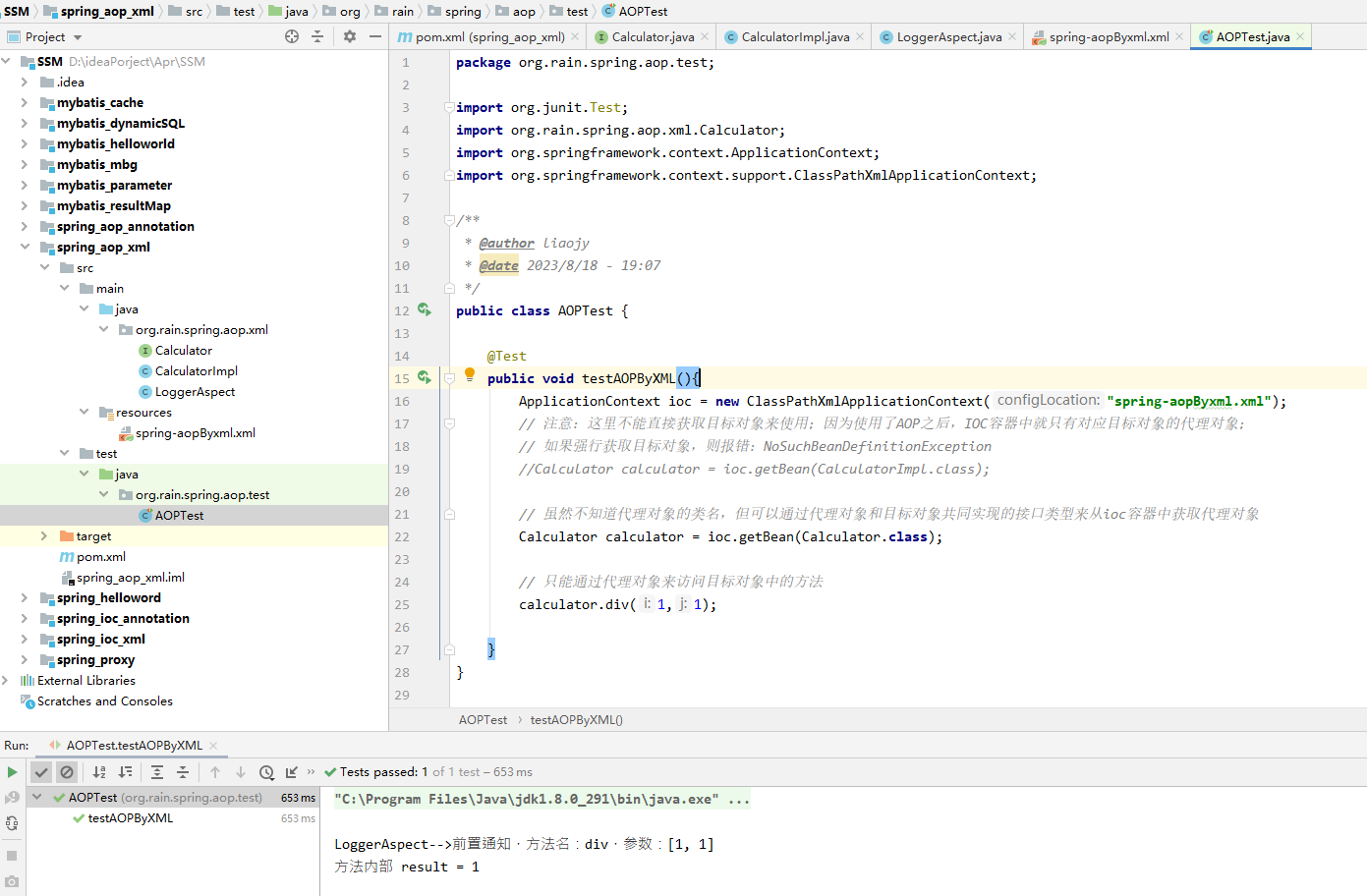
12.3、切入点表达式的复用
切入点表达的详细语法,请参考11.3.2节
12.3.1、配置公共的切入点表达式

<!--
aop:pointcut标签:用于声明公共的切入点表达式,效果等同于@Pointcut注解
id属性:设置该公共切入点表达式的唯一标识
expression属性:设置切入点表达式
-->
<aop:pointcut id="pointcutOne" expression="execution(* org.rain.spring.aop.xml.CalculatorImpl.*(..))"/>
12.3.2、使用公共的切入点表达式

<!--
aop:before标签:将方法设置为该切面的前置通知(方法),效果等同于@Before注解
method属性:指定(要设置为前置通知的)方法的名称
pointcut属性:设置该前置通知的切入点表达式
pointcut-ref属性:通过id引用对应的公共切入点表达式
-->
<!--<aop:before method="beforeMethod" pointcut="execution(* org.rain.spring.aop.xml.CalculatorImpl.*(..))"></aop:before>-->
<aop:before method="beforeMethod" pointcut-ref="pointcutOne"></aop:before>
12.4、其他通知的使用
12.4.1、后置通知
12.4.1.1、定义后置通知的功能

public void afterMethod(JoinPoint joinPoint){
String methodName = joinPoint.getSignature().getName();
Object[] args = joinPoint.getArgs();
System.out.println("LoggerAspect-->后置通知,方法名:"+methodName+",参数:"+ Arrays.toString(args));
}
12.4.1.2、配置后置通知到切面
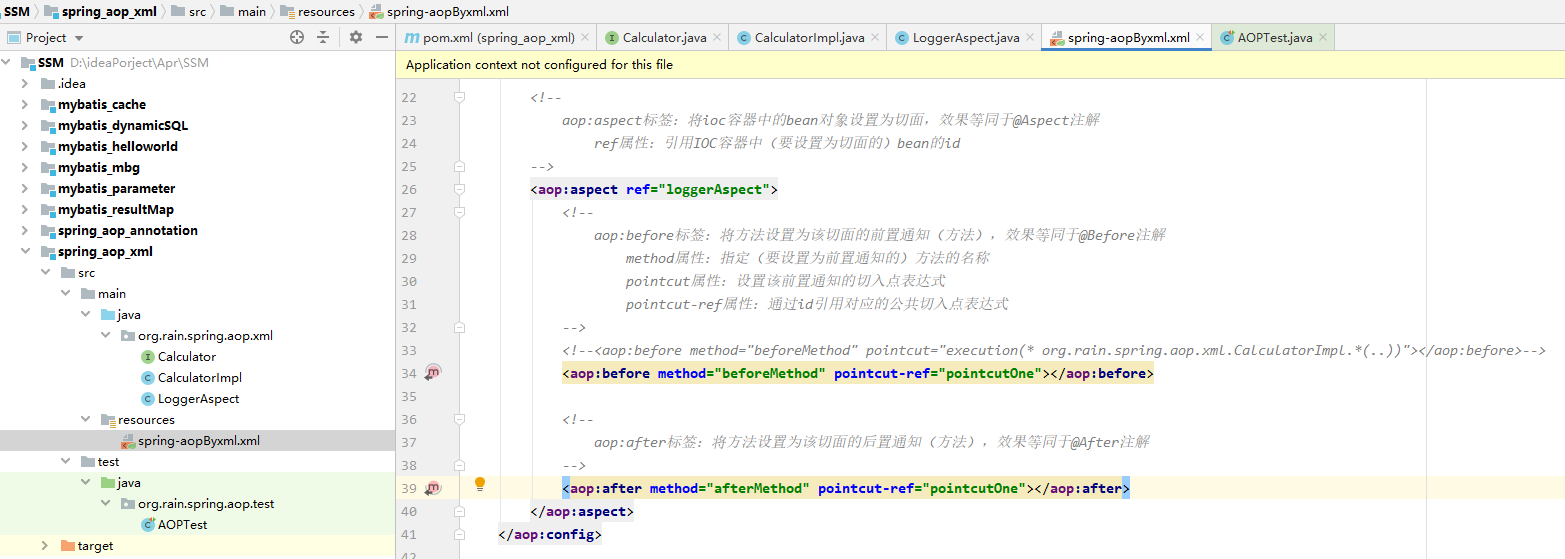
<!--
aop:after标签:将方法设置为该切面的后置通知(方法),效果等同于@After注解
-->
<aop:after method="afterMethod" pointcut-ref="pointcutOne"></aop:after>
12.4.1.3、测试使用效果

由控制台日志可知,后置通知在目标对象方法的finally子句中执行(一般用于释放资源)
@Test
public void testAOPByXML(){
ApplicationContext ioc = new ClassPathXmlApplicationContext("spring-aopByxml.xml");
// 虽然不知道代理对象的类名,但可以通过代理对象和目标对象共同实现的接口类型来从ioc容器中获取代理对象
Calculator calculator = ioc.getBean(Calculator.class);
// 只能通过代理对象来访问目标对象中的方法
calculator.div(1,0);
}
12.4.2、返回通知
12.4.2.1、定义返回通知的功能

public void afterReturningMethod(JoinPoint joinPoint,Object result){
String methodName = joinPoint.getSignature().getName();
Object[] args = joinPoint.getArgs();
System.out.println("LoggerAspect-->返回通知,方法名:"+methodName+",结果:"+ result);
}
12.4.2.2、配置返回通知到切面

<!--
aop:after-returning标签:将方法设置为该切面的返回通知(方法),效果等同于@AfterReturning注解
returning属性:指定返回通知(方法)中的某个参数(名),用于接收目标对象方法的返回值
-->
<aop:after-returning method="afterReturningMethod" pointcut-ref="pointcutOne" returning="result"></aop:after-returning>
12.4.2.3、测试使用效果

返回通知在目标对象方法的返回值之后执行
@Test
public void testAOPByXML(){
ApplicationContext ioc = new ClassPathXmlApplicationContext("spring-aopByxml.xml");
// 虽然不知道代理对象的类名,但可以通过代理对象和目标对象共同实现的接口类型来从ioc容器中获取代理对象
Calculator calculator = ioc.getBean(Calculator.class);
// 只能通过代理对象来访问目标对象中的方法
calculator.div(1,1);
}
12.4.3、异常通知
12.4.3.1、定义异常通知的功能

public void afterThrowingMethod(JoinPoint joinPoint,Exception ex){
String methodName = joinPoint.getSignature().getName();
Object[] args = joinPoint.getArgs();
System.out.println("LoggerAspect-->异常通知,方法名:"+methodName+",异常:"+ ex);
}
12.4.3.2、配置异常通知到切面

<!--
aop:after-throwing标签:将方法设置为该切面的异常通知(方法),效果等同于@AfterThrowing注解
throwing属性:指定异常通知(方法)中的某个参数(名),用于接收目标对象方法出现的异常
-->
<aop:after-throwing method="afterThrowingMethod" pointcut-ref="pointcutOne" throwing="ex" ></aop:after-throwing>
12.4.3.3、测试使用效果
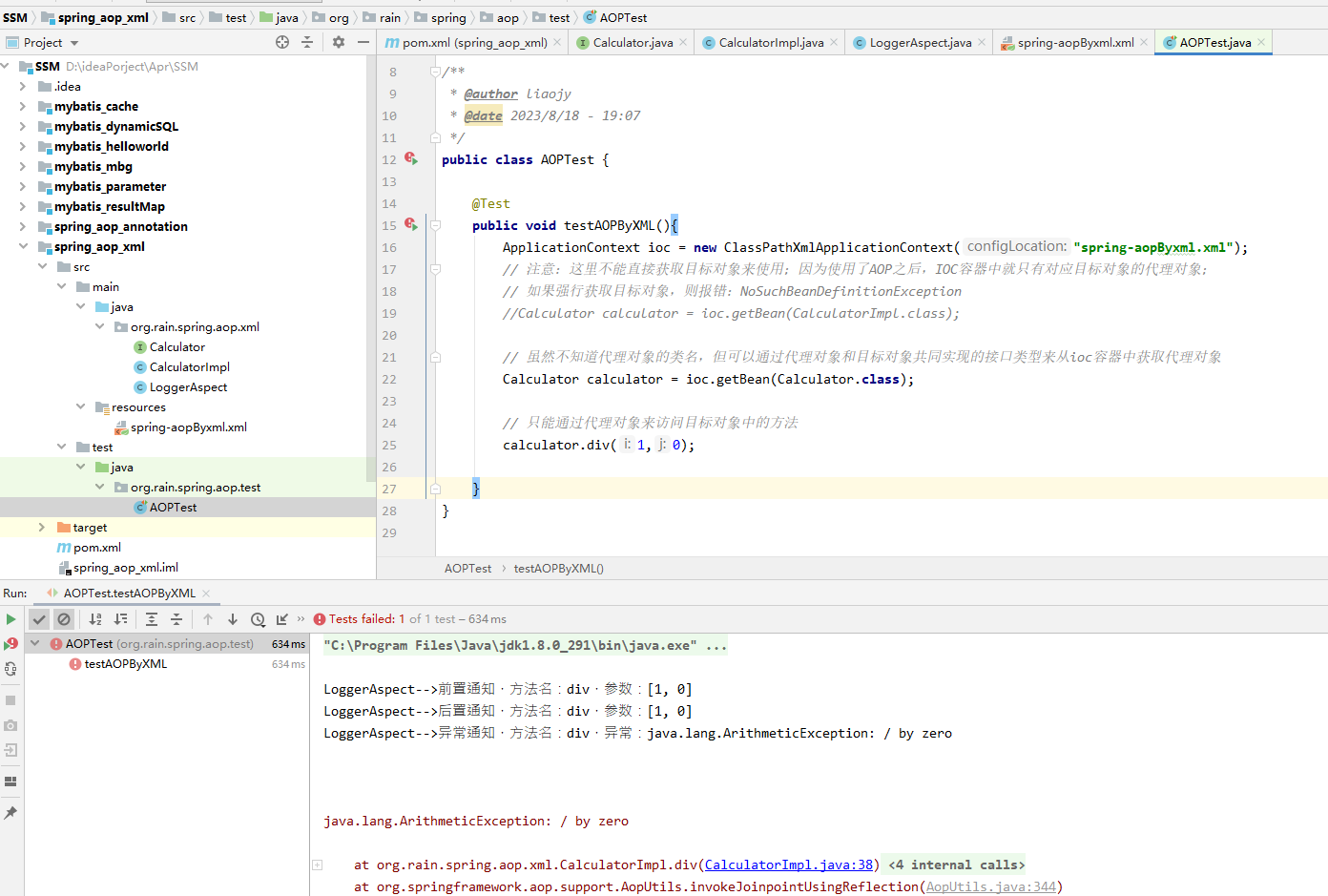
由控制台日志可知,异常通知在目标对象方法的catch子句中执行
@Test
public void testAOPByXML(){
ApplicationContext ioc = new ClassPathXmlApplicationContext("spring-aopByxml.xml");
// 虽然不知道代理对象的类名,但可以通过代理对象和目标对象共同实现的接口类型来从ioc容器中获取代理对象
Calculator calculator = ioc.getBean(Calculator.class);
// 只能通过代理对象来访问目标对象中的方法
calculator.div(1,0);
}
12.5、环绕通知
12.5.1、定义环绕通知的功能

环绕通知和动态代理的形式,非常相似
/**
* 环绕通知(方法)使用的参数是ProceedingJoinPoint类型
* 环绕通知(方法)的返回值,必须和目标对象方法的返回值一致
*/
public Object aroundMethod(ProceedingJoinPoint proceedingJoinPoint){
String methodName = proceedingJoinPoint.getSignature().getName();
Object[] args = proceedingJoinPoint.getArgs();
Object result = null;
try {
System.out.println("LoggerAspect-->环绕前置通知,方法名:"+methodName+",参数:"+ Arrays.toString(args));
// 表示目标对象方法的执行
result = proceedingJoinPoint.proceed();
System.out.println("LoggerAspect-->环绕返回通知,方法名:"+methodName+",结果:"+ result);
} catch (Throwable throwable) {
throwable.printStackTrace();
System.out.println("LoggerAspect-->环绕异常通知,方法名:"+methodName+",异常:"+ throwable);
}finally {
System.out.println("LoggerAspect-->环绕后置通知,方法名:"+methodName+",参数:"+ Arrays.toString(args));
}
return result;
}
12.5.2、配置环绕通知到切面

<!--
aop:around标签:将方法设置为该切面的环绕通知(方法),效果等同于@Around注解
-->
<aop:around method="aroundMethod" pointcut-ref="pointcutOne"></aop:around>
12.5.3、测试使用效果
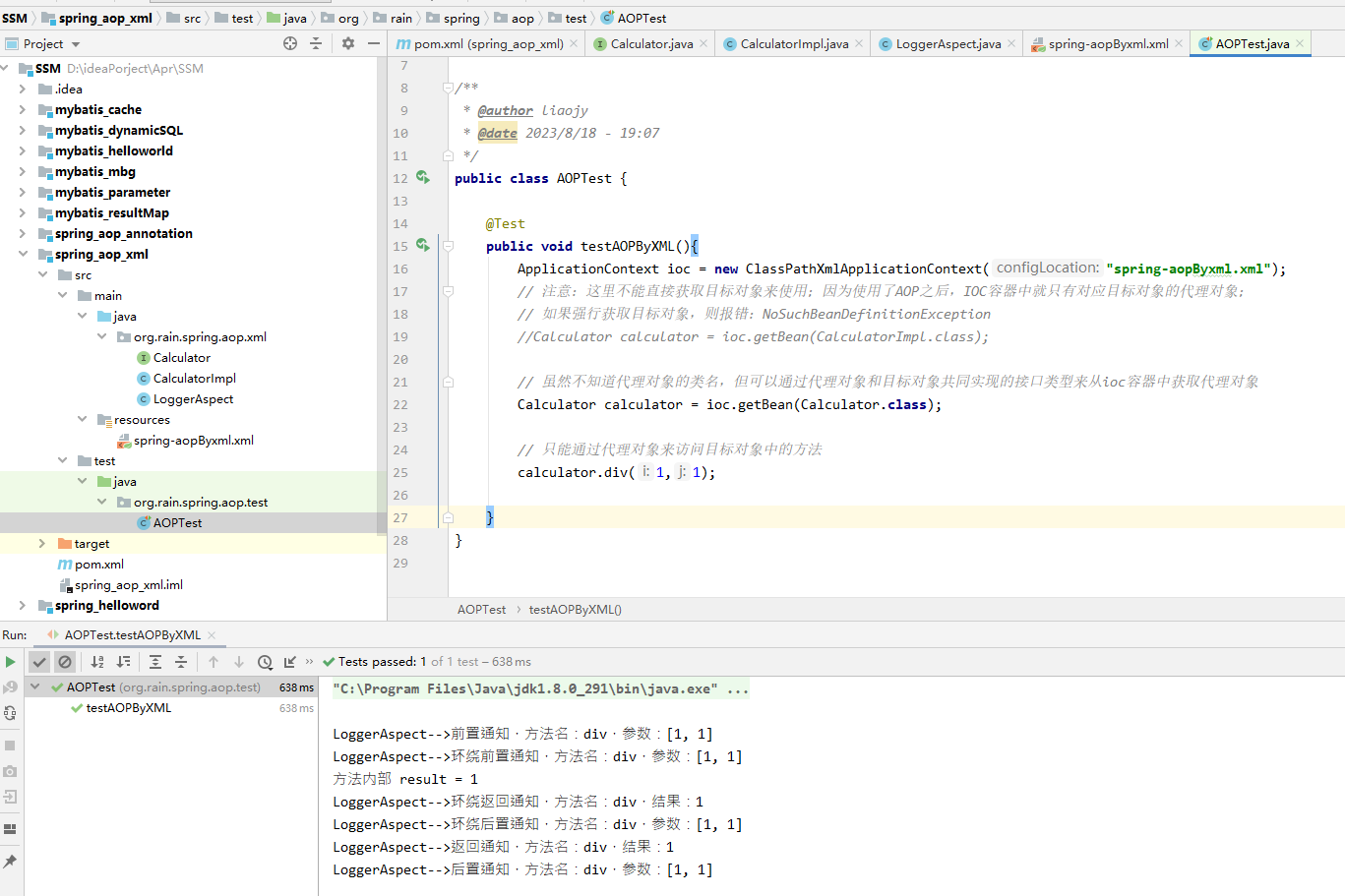
注意:因为环绕通知包括了其他四种通知,所以一般要么配置其他四种通知,要么只配置环绕通知;
本示例为了展示效果才同时配置
@Test
public void testAOPByXML(){
ApplicationContext ioc = new ClassPathXmlApplicationContext("spring-aopByxml.xml");
// 虽然不知道代理对象的类名,但可以通过代理对象和目标对象共同实现的接口类型来从ioc容器中获取代理对象
Calculator calculator = ioc.getBean(Calculator.class);
// 只能通过代理对象来访问目标对象中的方法
calculator.div(1,1);
}
12.6、切面的优先级
12.6.1、创建其他切面类ValidateAspect

package org.rain.spring.aop.xml;
import org.springframework.stereotype.Component;
/**
* @author liaojy
* @date 2023/8/20 - 23:59
*/
// @Component注解:保证这个目标类能够放入IOC容器
@Component
public class ValidateAspect {
}
12.6.2、定义前置通知的功能
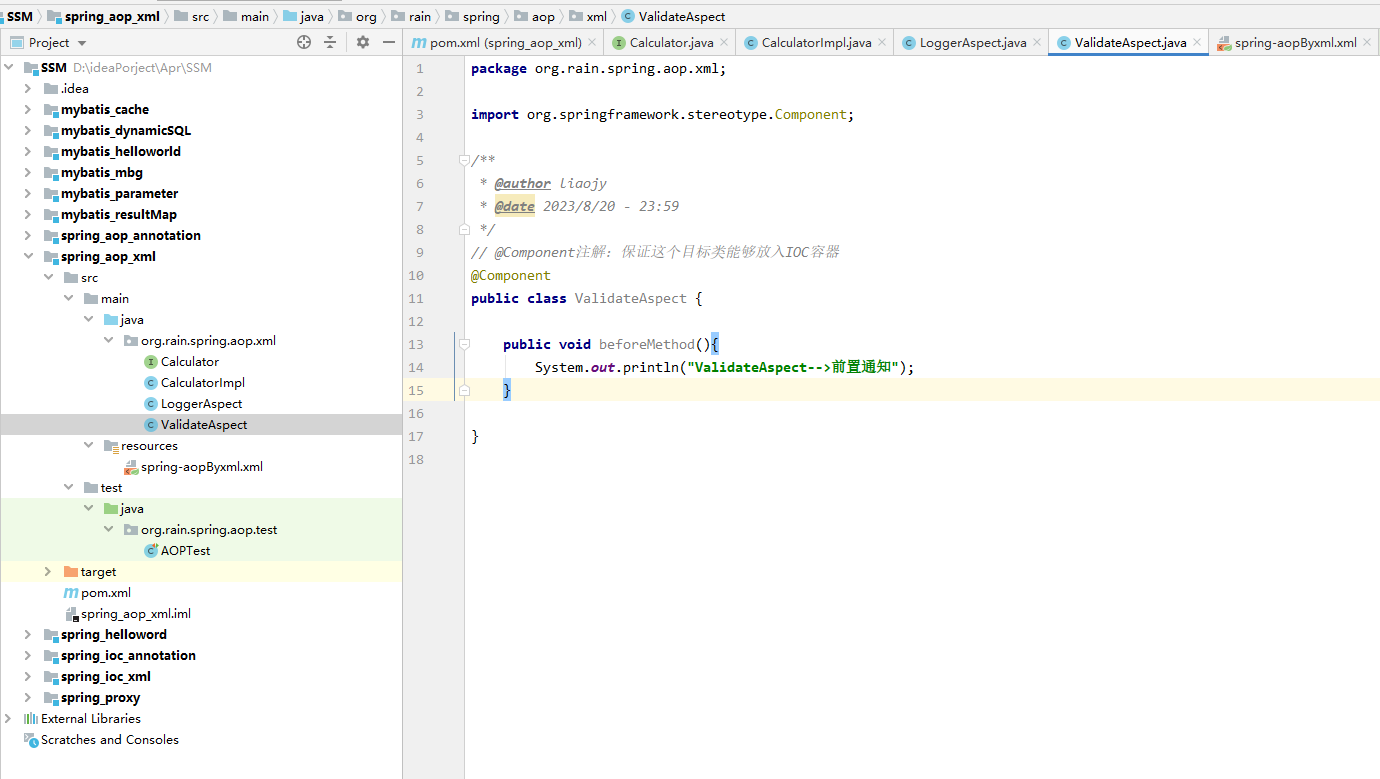
public void beforeMethod(){
System.out.println("ValidateAspect-->前置通知");
}
12.6.3、配置前置通知到切面
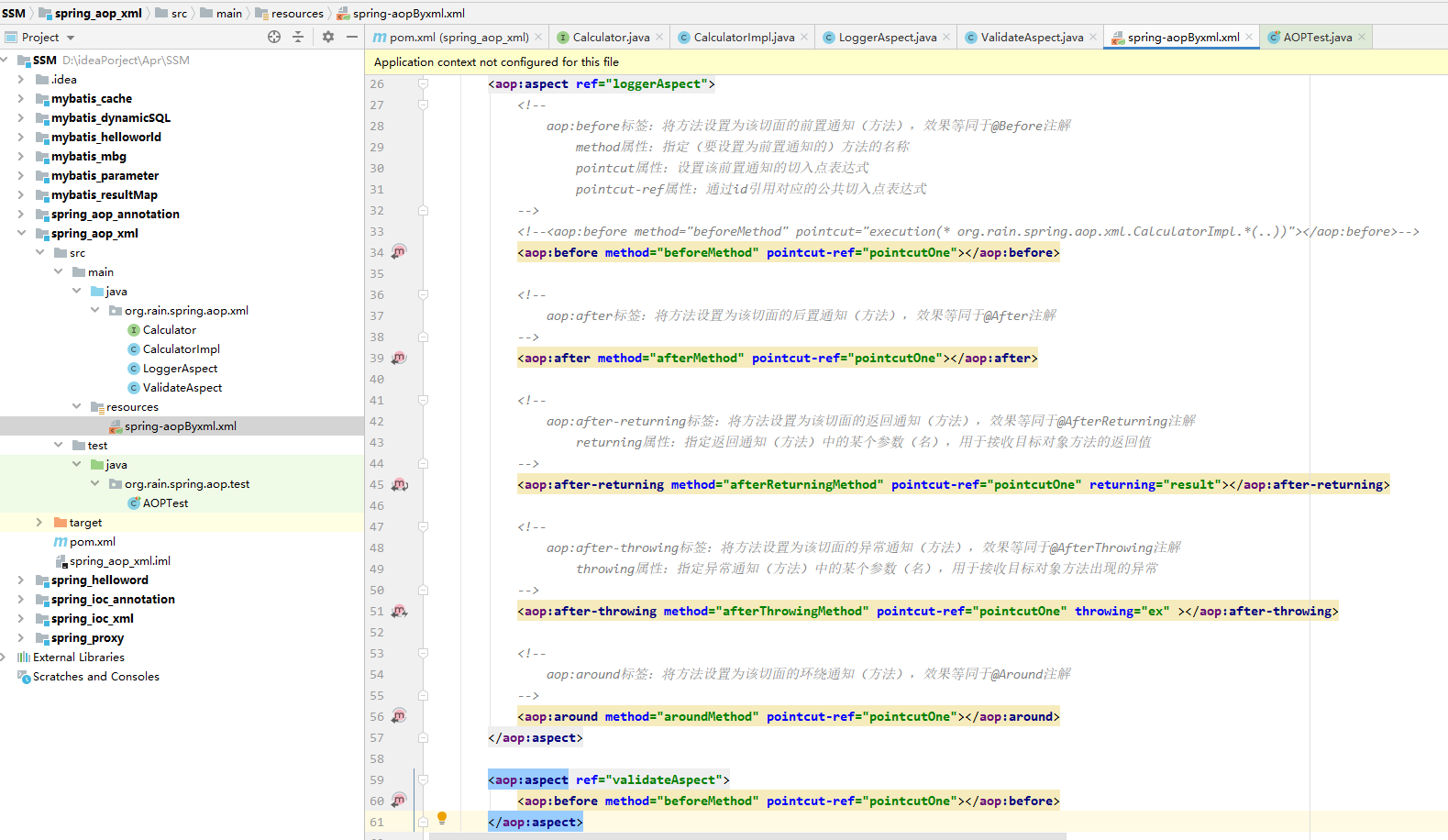
<aop:aspect ref="validateAspect">
<aop:before method="beforeMethod" pointcut-ref="pointcutOne"></aop:before>
</aop:aspect>
12.6.4、测试使用效果

由控制台日志可知,ValidateAspect切面的前置通知方法生效了,但执行顺序在LoggerAspect切面的前置通知方法的后面
@Test
public void testAOPByXML(){
ApplicationContext ioc = new ClassPathXmlApplicationContext("spring-aopByxml.xml");
// 虽然不知道代理对象的类名,但可以通过代理对象和目标对象共同实现的接口类型来从ioc容器中获取代理对象
Calculator calculator = ioc.getBean(Calculator.class);
// 只能通过代理对象来访问目标对象中的方法
calculator.div(1,1);
}
12.6.5、调整切面的优先级
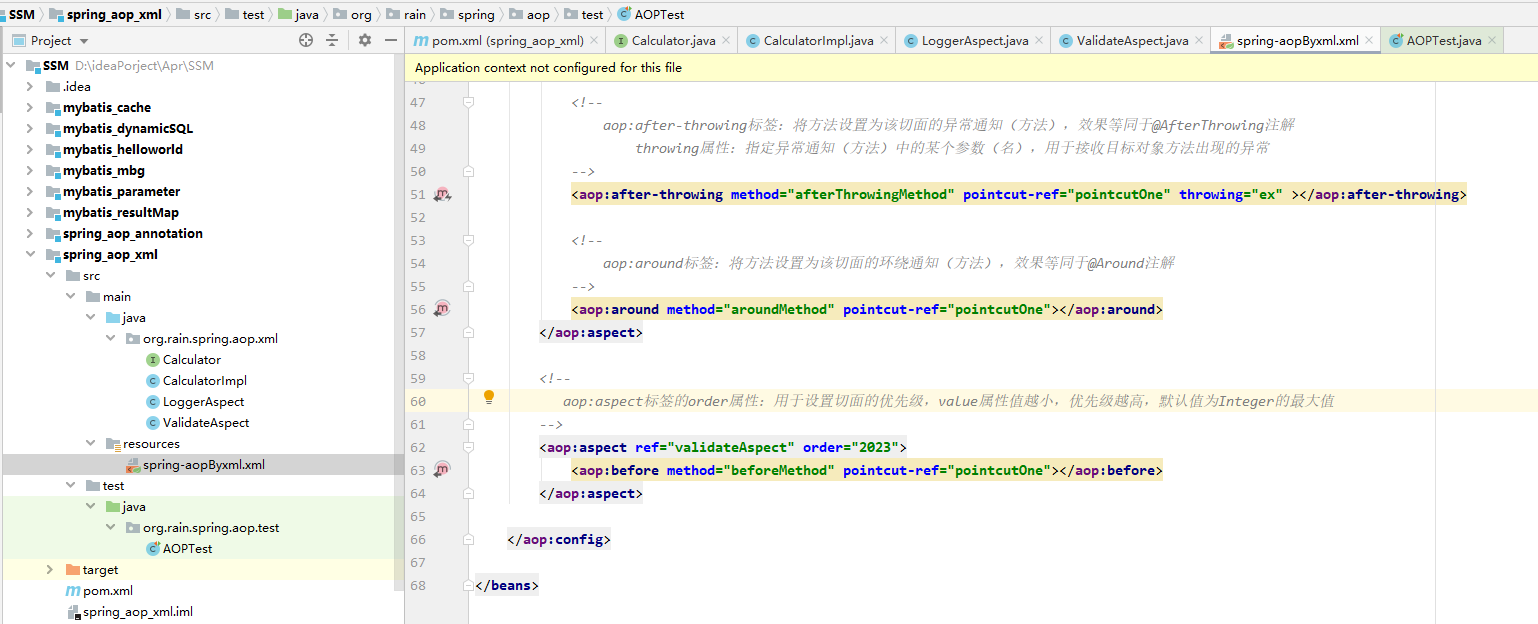
<!--
aop:aspect标签的order属性:用于设置切面的优先级,value属性值越小,优先级越高,默认值为Integer的最大值
-->
<aop:aspect ref="validateAspect" order="2023">
<aop:before method="beforeMethod" pointcut-ref="pointcutOne"></aop:before>
</aop:aspect>
12.6.6、测试调整后的效果

由控制台日志可知,ValidateAspect切面的前置通知方法的执行顺序,在LoggerAspect切面的前置通知方法的前面
这是因为ValidateAspect切面的Order属性值已设为2023,要小于LoggerAspect切面所使用的默认值(Integer的最大值2147483647)
热门相关:神秘总裁小小妻 异世修真邪君 大妆 异世修真邪君 拒嫁豪门,前妻太抢手